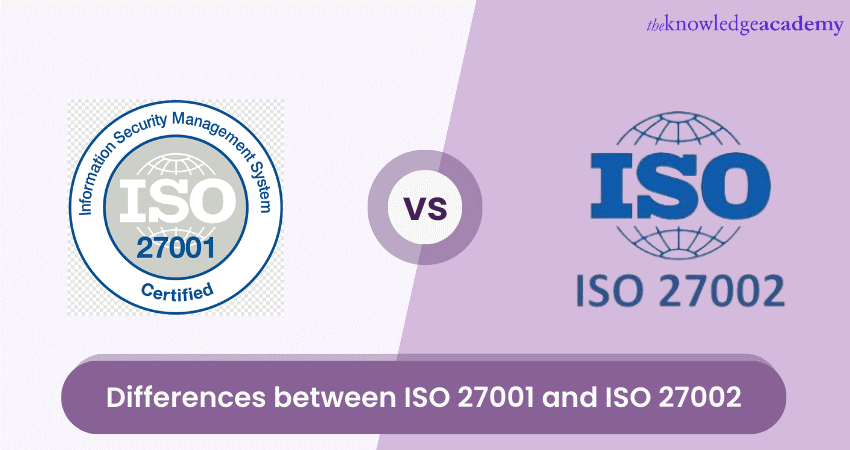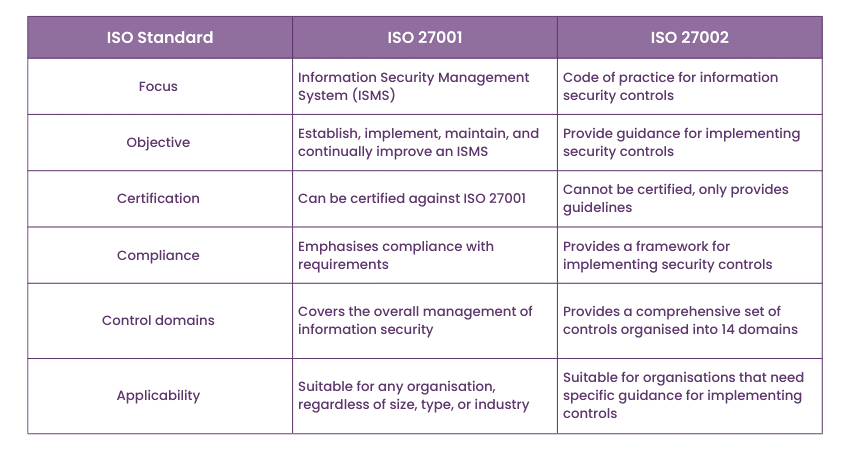We may not have the course you’re looking for. If you enquire or give us a call on 01344203999 and speak to our training experts, we may still be able to help with your training requirements.
Training Outcomes Within Your Budget!
We ensure quality, budget-alignment, and timely delivery by our expert instructors.

The ISO 27001 vs ISO 27002 debate is crucial for organisations seeking information security and data protection. These Standards help companies enhance their data security, efficiency and boost revenue. Achieving certification for Information Security Standards is a common goal for companies aiming to fortify their data protection practices.
According to Statista, 21 per cent of all organisations and 57% of large-scale organisations in the United Kingdom know about ISO 27001 and its benefits. After adopting the ISO 27001 Standards, one can further strengthen their organisation's information security by adopting ISO 27002. But what are the key points of differences between them? In this blog, you will learn the differences between ISO 27001 vs ISO 27002 and understand why data is essential for any modern organisation.
Table of Contents
1) A brief introduction to ISO 27001 and ISO 27002
2) What are the differences between ISO 27001 vs ISO 27002?
3) When should you use each Standard?
4) How do ISO 27001 and ISO 27002 relate to each other?
5) Benefits of ISO compliance
6) Conclusion
A brief introduction to ISO 27001 and ISO 27002
Before we discuss their differences in detail, we will first discuss both ISO 27001 and ISO 27002 in detail.
What is ISO 27001?
Originally published by the International Organization for Standardization (ISO) along with the International Electrotechnical Commission (IEC), the ISO 27001 Standards makes up the core of the framework for the ISO 27000 series. It is a collection of documents that outline Standards for Information Security Management. ISO 27001, also called ISO/IEC 27001, is the central set of certification Standards for the planning implementation, operation, monitoring and improvement of an Information Security Management System (ISMS).
What is ISO 27002?
ISO 27002, or ISO/IEC 27002:2022, offers guidance on selecting, implementing, and managing security controls based on an organisation's information Security Risk Environment. In other terms, it is a supplementary Standards that supports ISO 27001 and goes into greater detail about the Information Security controls that an organisation may apply from the ISO 27001 list.
Take the first step towards securing your organisation's information with our comprehensive ISO 27001 Foundation course – register now!
What are the differences between ISO 27001 and ISO 27002?
There are five main differences between ISO 27001 and ISO 27002, all five of which we have discussed in detail as follows:

Applicability
A key aspect to consider when implementing an ISMS is that not all the Information Security controls are applicable to your organisation. ISO 27001 framework clarifies that organisations must conduct a risk assessment to help identify and prioritise Information Security threats.. On the other hand, ISO 27002 does not specify this – so if you were to adopt the Standard, it would be practically impossible to determine what controls you should adopt.
Detail
ISO 27002 is much more detailed than its predecessor. It would be unnecessarily long and complicated if ISO 27001 delved into as much detail as ISO 27002. Instead, ISO 27001 provides an outline of each aspect of an ISMS, with specific guidance found in additional Standards.
Control domains
ISO 27001 is not specific to control domains and covers the overall management of information security for an organisation. On the other hand, ISO 27002 provides a comprehensive set of controls organised into 14 domains (e.g., access control, Incident Management, physical security etc.)
Want to learn ISO 27002? Join our industry leading ISO 27002 Training today.
Certification
Another point of difference between ISO 27001 and ISO 27002 is certification. While one can certify to ISO 27001, ISO 27002 does not provide a certificate. This is because ISO 27001 is a management Standard that offers a full list of compliance requirements, while supplementary Standards such as ISO 27002 address certain aspects of an ISMS.
Compliance
While ISO 27001 Compliance prioritises with legal, regulatory and contractual requirements, ISO 27002 provides a framework for implementing security controls based on an organisation's unique needs.

When should you use each Standard?
How and when you use each security Standard will depend on your organisational goals and current security posture. This section of the blog will suggest the most suitable Standard according to your organisation's information security objectives.
ISO 27001
ISO 27001 lays the foundation for a concrete ISMS, mainly focusing on two key objectives:
a) Risk assessment: It identifies any potential risks and vulnerabilities to data within the organisation.
b) Risk mitigation: It determines what steps an organisation must take to safeguard their data.
Organisations should implement ISO 27001 when they:
a) Aim to achieve certification to the international security Standards
b) Do not have an ISMS and want to implement one based on the best global Standard
c) Want to assess and mitigate any ISO 27001 Physical Security risks in the organisation
d) Need to ensure compliance with business, legal or regulatory requirements
ISO 27002
ISO 27002 provides further elaboration on the details contained in the Annex A controls of ISO 27001, offering additional guidance to organisations seeking to implement security controls specified in the ISO 27001 Controls list. Organisations should only use ISO 27002 after identifying the security controls they plan to implement from the previous version of the security Standard. ISO 27002 helps organisations apply the framework they developed in ISO 27001. Therefore, it should only be used in tandem with ISO 27001.
Want to gain the expertise to lead and conduct successful ISO 27001 audit? Sign up for our ISO 27001 Lead Auditor Course today!
How do ISO 27001 and ISO 27002 relate to each other?
ISO 27001 and ISO 27002 are two very closely related international Standards which address Information Security Management within organisations. These two Standards are used with each other as ISO 27002 helps organisations implement controls and Standards to be ISO 27001 certified. The following table will help you understand the relation between ISO 27001 vs ISO 27002.
| ISO 27001 | ISO 27002 |
|
It is a core standard which outlines the requirements to implement the Information Security Management System (ISMS) |
Provides a detailed guide to practise and implement security control of the ISO 27001 standard |
|
Covers all the aspects of ISMS, including Risk Management, policies, procedures and continuous improvement |
Focuses on the selection and implementation of the security controls to address Information Security |
| ISO 27001 provides certificates based on compliance and its requirements through ISO 27001 Audits conducted by accredited certification bodies |
ISO 27002 is not a certification standard. However, organisations can refer to this standard when implementing security controls aligned with ISO 27001 to meet the certification requirements. |
|
It limits the threat and risks from fraud, theft and misuse of facilities by employees or third-party users |
It includes checking the backgrounds of job applicants, contractors and third-party users in alignment with the company’s ethics and laws |
Want to learn about ISO 27002? Join our industry leading ISO 27002 Training today.
Benefits of ISO compliance
The rise of digital technologies has raised concerns about Cybersecurity among businesses. To reduce the risk from these security threats, organisations globally adapt to ISO compliances. Some of the key benefits of adopting ISO 27001 and ISO 27002 are as follows:
Benefits of ISO 27001
ISO 27001 is an internationally acknowledged Standard which focuses on Information Security Management Systems (ISMS). Some of the salient benefits of this Standard in an organisation are:
a) Improved Information Security: ISO 27001 Checklist helps in identifying and mitigating Information Security risks. It reduces the possibilities of data breaches, cyberattacks and unauthorised access.
b) Risk Management: This Standard provides a systematic approach that helps in assessing, managing, and mitigating security risks. It ensures that the vulnerabilities in the framework are addressed efficiently.
c) Protecting confidential data: ISO 27001 enables organisations to safeguard their sensitive data, trade secrets, and any other confidential information.
Benefits of ISO 27002
ISO 27002 is a guideline Standard which helps organisations to implement security controls. Some of its unique benefits are as follows:
a) Guidance support: ISO 27002 provides detailed guidance on various aspects of implementing Information Security, making it a valuable resource to strengthen its security framework.
b) Customisation: This Standard allows organisations to customise their security controls based on their industry Standards, risk profiles, etc. and make sure that security measures are necessary and practical.
c) Legal and regulatory compliance: ISO 27002 assists organisations to stick to the policies and meet regulatory or legal compliances related to information Security.
Conclusion
We hope you enjoyed reading this blog on the ISO 27001 vs ISO 27002 debate Understanding the fact that both Standards are interconnected and can complement each other is a step towards strengthening your Information Security.
Want to elevate your organisation's Cybersecurity practices? Make sure to register for our industry-leading ISO 27001 Certification!
Frequently Asked Questions
Upcoming IT Security & Data Protection Resources Batches & Dates
Date
 ISO 27001 Foundation
ISO 27001 Foundation
Mon 8th Jul 2024
Mon 12th Aug 2024
Mon 9th Sep 2024
Mon 14th Oct 2024
Mon 11th Nov 2024
Mon 9th Dec 2024
Mon 27th Jan 2025
Mon 24th Feb 2025
Mon 24th Mar 2025
Tue 22nd Apr 2025
Tue 27th May 2025
Mon 23rd Jun 2025
Mon 28th Jul 2025
Mon 25th Aug 2025
Mon 22nd Sep 2025
Mon 27th Oct 2025
Mon 24th Nov 2025
Mon 15th Dec 2025







 Top Rated Course
Top Rated Course


 If you wish to make any changes to your course, please
If you wish to make any changes to your course, please


